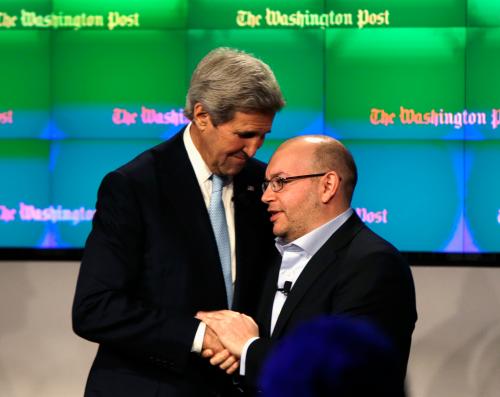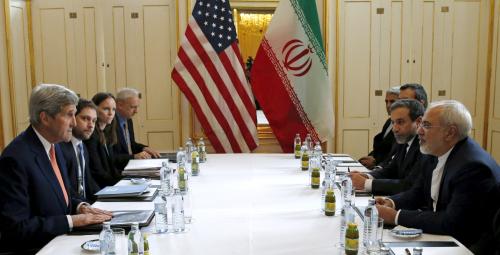The Obama administration has now grudgingly acknowledged what has been obvious since the January release of five Americans who were imprisoned unjustly in Iran: that a simultaneous $400 million payment to settle a decades-old financial dispute between the two countries was used as leverage to secure the Americans’ freedom.
That may come as a surprise, since the White House has denied the linkage indignantly and, in my opinion, quite foolishly, in recent weeks, ever since Republican critics of the administration’s diplomacy toward Tehran denounced the payment as ransom.
But it should not come as a shock, nor should it discredit the administration’s approach to Iran, since the use of financial leverage to persuade Tehran to curtail its most dangerous policies has constituted a core element of U.S. policy toward Iran for nearly 40 years. Every U.S. president, both Republican and Democrat, has adhered to the formula adopted in the days after the 1979 seizure of the American embassy in Tehran: to hold open the door to negotiations while increasing the costs to Tehran for its malfeasance.
And more importantly, rather than debating tactics that have a central component in the U.S. policy arsenal for dealing with Iran for four decades, both sides should be contemplating the deeper issue with Washington’s readiness to use cash to induce more constructive Iranian behavior: it doesn’t actually work all that well.
[T]he use of financial leverage to persuade Tehran to curtail its most dangerous policies has constituted a core element of U.S. policy toward Iran for nearly 40 years.
The non-scandal scandal
The controversy over this latest incident is yet another example of the polarized environment for Iran policy that has emerged since the breakthrough diplomacy on the nuclear issue over the past three years. Both sides of the partisan divide bear responsibility for that, but there would have been no flap over the $400 million if the Obama administration had not gotten caught up in its own formidable spin machine on Iran. The rush to rebut Republican criticism of the nuclear deal and the diplomatic engagement with Iran seems to have prompted an incredibly counterproductive and implausible White House response to the howls of outrage over the $400 million payment.
The payment—the first installment in the $1.7 billion settlement of pre-revolutionary payments for military equipment that was never delivered to Tehran—was first reported when the Americans were released in January. However, recent revelations surrounding the details of the exchange continued to spark controversy, and prominent Republicans, including presidential candidate Donald Trump, voiced outrage at the disclosure earlier this month that the payment was made in cash, via an airlift of pallets of foreign banknotes that arrived in Tehran on the same day as the prisoner release.
The administration initially insisted arrangements for the prisoner release and the $400 million disbursement were conducted along entirely separate and unrelated diplomatic channels. President Obama himself scoffed that the very notion of Washington paying a bounty for the release of the detained dual nationals, saying that the allegation “defies logic,” and White House spokesman Josh Earnest dismissed the allegations of ransom as “a false claim.”
Subsequent revelations, including this week’s report in the Wall Street Journal that the Americans’ departure was from Tehran was delayed until the special flight transporting the money had actually landed in Iran, have prompted the administration to revise its response. On Thursday, State Department spokesman John Kirby conceded that the payment and the prisoner release were directly related. In an effort to put a positive spin on the administration’s backtracking, Kirby emphasized that “we took advantage of leverage that we felt we could have to make sure that they [the imprisoned Americans] got out safely and efficiently.”
Does that constitute a ransom? Linguists can debate the nuances of each side’s preferred rhetoric. I can understand why the Obama administration recoiled at the description. Ransom is an ugly word, and in diplomacy, it is a dangerous one, which is why this White House and its predecessors have insisted that Washington will not provide payments or other concessions to terrorists who seize American citizens.
However, it’s clear—as it was back in January—that the $400 million payment was used as quid pro quo to grease the wheels of Iran’s revolutionary system to extricate four Iranian-Americans whom Tehran had detained on trumped-up charges for months and in some cases years. (A fifth imprisoned American was released at the same time, although his case was said to be separate.)
That is not a scandal.
That is not a scandal. Washington has always relied heavily on financial leverage—both penalties and incentives—in addressing the challenges posed by revolutionary Iran. That is the point of sanctions, after all, which Washington has deployed with frequency and growing intensity against Iran over the course of the past 37 years. And it was the logic of the Iran-contra mess, when the Reagan administration sought to use arms sales to Tehran to facilitate the release of hostages in Lebanon and empower purported Iranian moderates.
The original tug-of-war between Washington and Iran’s Islamic Republic of Iran—when Iranian students seized the U.S. Embassy in Tehran and held its personnel as hostages for more than 15 months—ended only as part of a carefully crafted set of diplomatic and financial arrangements that included a coordinated release of the hostages in concert with the transfer of $7.956 billion in previously frozen Iranian overseas assets to an escrow account.
The financial claims emanating from pre-revolutionary transactions between the Shah’s government and Washington, such as the one that the $400 million payment was intended to resolve, have themselves been have repeatedly viewed as evidence of and/or impetus for prospective political softening. In 1984, U.S. officials trumpeted the news that Tehran had agreed to pay a $419 million settlement to the U.S. Export-Import Bank for credits extended prior to the revolution for the purchase of American goods as a signal that Tehran was moderating. In 1991, Washington and Tehran agreed to a $278 million payment as compensation for military equipment that the Shah paid for but was undelivered at the time of the revolution—a payoff that came on the heels of the release of two high-profile Western hostages in Lebanon.
In this sense, the Obama administration’s decision to coordinate the resolution of the outstanding claim with the release of the Americans in January is perfectly consistent with the approach undertaken by each of its predecessors.
PR missteps
What is unfortunate is that the Obama administration could not simply acknowledge this reality, and instead sought to use the $400 million settlement as evidence of the success of the nuclear deal. Obama’s assertion that “the issue is not so much that it was a coincidence, as it is that we were able to have a direct discussion” is disingenuous, in failing to acknowledge that there has been a mechanism for a direct discussion between Washington and Tehran over the residual revolutionary claims since January 1981, when the two countries signed the Algiers Accords—the agreement that freed the hostages and established the U.S.-Iran Claims Tribunal.
Even worse, White House spokesman Josh Earnest conflated any criticism of the payment with the kind of rhetoric used by “hard-liners in Iran in an attempt to undermine the nuclear agreement”—an unfair smear that the White House has proven all too eager to deploy throughout the course of the fiercely contested diplomacy with Tehran.
Finally, it’s not clear to me that the settlement was really a good deal. Secretary of State John Kerry has emphasized that the $1.7 billion settlement with Tehran “actually saved the American taxpayer potentially billions of dollars.” The correct valuation of the remaining claims is difficult to assess, but it is worth noting that Iran has always cited much higher values for the outstanding claims than most American officials found credible. Sixteen years ago, the last time Washington put forward sanctions relief as an overture toward Tehran, U.S. officials openly scoffed at Iranian estimations of $10 billion for the remaining claims, suggested the real number was in the hundreds of millions.
Can’t buy love
Ultimately, what’s important here is not the relentless partisanship by both the White House and its domestic political opponents on Iran policy, but the efficacy of the policy itself. Did the resolution of the outstanding financial claims against Washington actually help persuade Tehran to relinquish the jailed Americans or—more importantly—to end its use of hostage-taking as a weapon of state? There, I’m even more dubious.
As I discuss in much greater detail in a recent book, the use of economic incentives as bargaining chips in extracting concessions from Iran, as well as other countries, has had a fairly problematic track record. There tend to be significant divergences in the valuation of prospective incentives, and for better or for worse, money has almost never ranked at the top of the priority list in Iranian foreign policy. And that is undoubtedly true for the seizure of Americans and other dual nationals in Iran. As I wrote in January, “For Tehran, jailing Americans was never motivated by the prospect of a payoff. Rather, the center of gravity within Iran’s ruling elite remains convinced that there is an American-led conspiracy of regime change, facilitated by dual nationals such as those who were arrested.”
That remains the case even today, when there are at least six dual nationals—including two American citizens and a permanent U.S. resident—sitting in Iranian prisons on wholly spurious grounds. These actions are driven by the deeply conspiratorial mindset that is an integral element of the political culture of modern Iran. It’s not about the money, and Iran’s worst policies won’t be mitigated by a payoff of any sum.






Commentary
Iran and the “ransom”: It’s not about the money
August 19, 2016